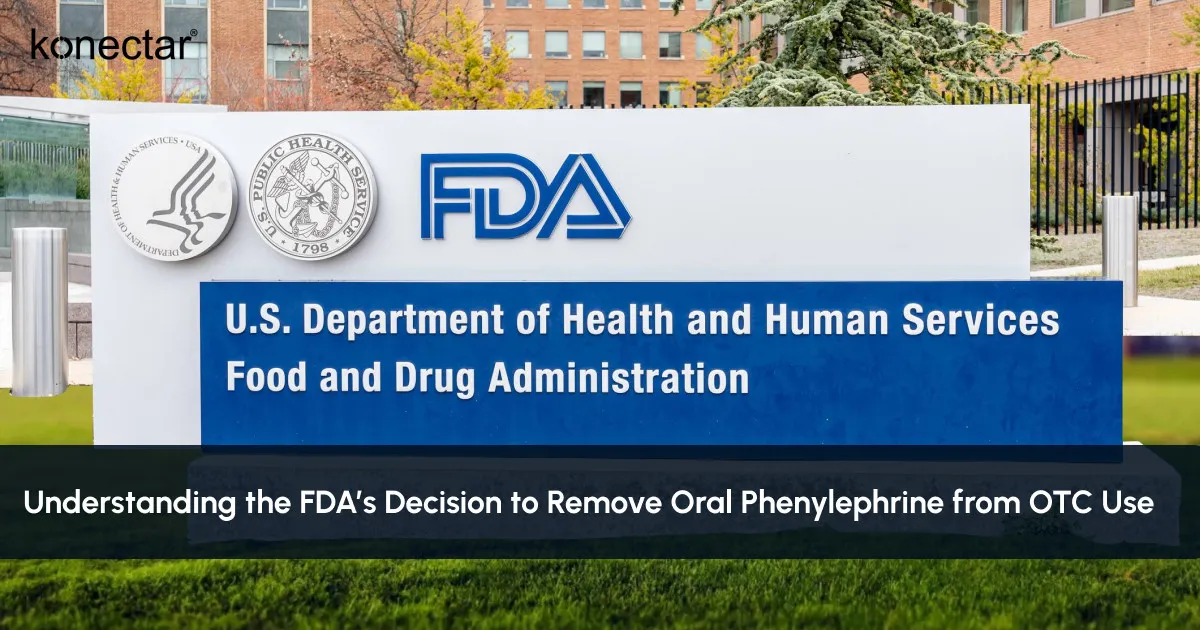25-11-2024
Understanding the FDA’s Decision to Remove Oral Phenylephrine from OTC Use

Nasal congestion is a common affliction that can disrupt daily functioning. It is usually caused by a cold or allergies. Over-the-counter nasal decongestants are widely prescribed and used to mitigate the symptoms of nasal congestion. Other alternatives include decongestant medicine or nasal spray for congestion.
In this article:
Effectiveness of Different Decongestants
Nasal decongestants are known to relieve congestion by reducing the swelling of blood vessels in the nasal passages. One of the main medications is phenylephrine nasal spray. The United States Food and Drug Administration (FDA) recently reviewed OTC medications containing phenylephrine, particularly oral ones, to ascertain their effectiveness at prescribed dosages.
Recent FDA Order and Its Impact on Phenylephrine Products
The (FDA) held a press release to announce their proposal to remove oral phenylephrine as an active ingredient in over-the-counter (OTC) nasal decongestant products.
This order comes out after an extensive study of historical data and recent clinical studies. The discussion was initiated in 2023 when the FDA held a Nonprescription Drug Advisory Committee (NDAC) to review the status of this chemical agent.
The committee came to a unanimous decision that oral phenylephrine, at currently prescribed doses, is ineffective as a nasal decongestant.
The final order is pending, based on which the products utilizing phenylephrine will be affected. For now, the FDA has asked the general public to check the labels of their OTC decongestant drugs, and healthcare companies (HCOs) can still market phenylephrine products for treating nasal decongestion.
Alternative Decongestant Options
In response to this recent order, many consumers and healthcare professionals are turning to other forms of congestion relief. OTC for nasal congestion includes options like nasal drops for congestion, which effectively target the symptoms directly at the source. In addition, nasal decongestion spray continues to be a preferred choice for immediate relief.
Consumer Response and Industry Adaptation
The FDA has opened the floor to the public, inviting comments on this proposed order. Consumers can submit their comments on the official FDA website. After analyzing the comments, if oral phenylephrine is found to be inefficient for treating nasal congestion, a final order will be issued. The FDA has also assured that it will give manufacturers enough time to re-formulate or remove such drugs from the market.
Looking Forward
This proposal by the FDA also highlights the need for rigorous evaluation of all decongestant medications, ensuring they meet the safety standards.
The FDA remains committed to continuing its review of active ingredients in OTC products, which means further adjustments as data becomes available.
Consumers must stay informed about these regulatory changes to make informed decisions in consultation with their healthcare providers.
References
U.S. Food and Drug Administration. (2024). FDA proposes ending use of oral phenylephrine as an OTC monograph nasal decongestant active ingredient after reviewing scientific evidence. Retrieved from https://www.fda.gov/news-events/press-announcements/fda-proposes-ending-use-oral-phenylephrine-otc-monograph-nasal-decongestant-active-ingredient-after
Pan American Health Organization. (2024). FDA proposes ending use of oral phenylephrine as OTC monograph nasal decongestant active ingredient after extensive review. Retrieved from https://prais.paho.org/en/fda-proposes-ending-use-of-oral-phenylephrine-as-otc-monograph-nasal-decongestant-active-ingredient-after-extensive-review/





